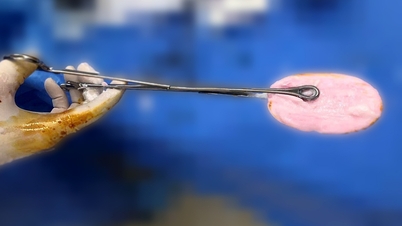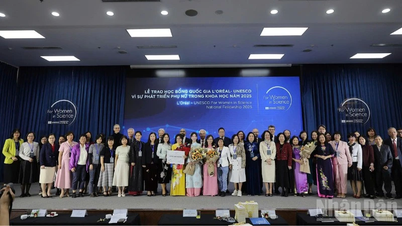
Endocrine-disrupting chemicals can affect not only one generation but also many generations to come - Photo: AI
The study was presented on July 13 at the annual meeting of the American Endocrine Society (ENDO 2025) held in San Francisco, California.
"More and more girls are entering puberty early, increasing their risk of health problems later in life," said Dr. Xin Hu, lead researcher from the Rollins School of Public Health at Emory University in Georgia.
"We wanted to understand why this happens, by tracing how environmental influences from the grandparents' generation might influence the timing of puberty in girls."
Endocrine-disrupting chemicals can have effects that span generations.
The team used data from the Child Health and Development Study (CHDS), a long-term follow-up project that began in the 1960s. They measured thousands of small molecules in blood samples collected from 249 couples at that time, and tracked their chemical and metabolic profiles over three generations.
Researchers focused on analyzing the timing of first menstruation of daughters (247 people) and granddaughters (139 people) of participating mother-child pairs.
The results showed that while the age of puberty in girls remained almost unchanged compared to their mothers, in the generation of granddaughters, those born around 1990, the average age of menarche had dropped by a full year.
Remarkably, several chemicals detected in the blood of both fathers and mothers were linked to puberty in the next generation. This effect was particularly evident in daughters, suggesting that the impact may be stronger with each generation.
Endocrine-Disrupting Chemicals (EDCs) are substances that can alter the body's natural endocrine function. They are present in air, soil, water, food, cosmetics, and many consumer products. People can absorb EDCs through breathing, eating, or through the skin.
One common substance, phenoxyethanol, a common preservative in cosmetics and foods, has been found to be linked to early puberty, especially when both parents have similar exposure levels.
The father's influence is greater than the mother's.
According to Dr. Xin Hu, the study shows that not only mothers but also fathers/grandfathers play an important role in shaping the puberty timing of daughters and granddaughters. Notably, in some cases, the influence of fathers is even greater than that of mothers, something that has previously been rarely recognized in genetic and reproductive health studies.
“We believe this is the first population-scale study to demonstrate that the father's environment and chemical exposure can influence the endocrine and reproductive development of both the daughter and granddaughter generations,” Dr. Hu emphasized.
She said the discovery opens up new directions for early prevention strategies, noting that protecting the health of future generations will not be effective if the influence of the father is ignored.
Sharing the same view, Dr. Barbara Cohn (California State Public Health Institute) affirmed: "This discovery highlights the role of endocrine disrupting chemicals during particularly sensitive periods such as conception and pregnancy. The environmental impacts are not only short-term but can last and affect many generations."
Source: https://tuoitre.vn/ong-ba-tiep-xuc-voi-hoa-chat-co-the-khien-chau-day-thi-som-20250714161210649.htm


![[Photo] Prime Minister Pham Minh Chinh receives President of Cuba's Latin American News Agency](/_next/image?url=https%3A%2F%2Fvphoto.vietnam.vn%2Fthumb%2F1200x675%2Fvietnam%2Fresource%2FIMAGE%2F2025%2F12%2F01%2F1764569497815_dsc-2890-jpg.webp&w=3840&q=75)










































































































Comment (0)